THE THEATRES.
THE attraction of the Christmas entertainments during the holydays has rendered novelty unnecessary. The return of Madame VESTA'S and Mr. C. MATHEWS to the Haymarket, however, and the renewal of Mrs. NISBETT'S engagement, afforded the manager an opportunity of producing on that stage the Merry Wives of Windsor; in which the two lady-leaders in light comedy appear together. The success of the per- formance was such that it was announced for nightly repetition ; and the representation was effective enough to justify its continuance. It was a pleasure to share the hearty merriment of the well-filled house, and to yield to the uncritical mood of the majority. One could not help thinking what a different effect this same performance would have produced at one of the great theatres, and how much more home the incidents were brought on the smaller stage. A good deal may be urged in favour of a larger area for tragedy : remoteness, grandeur, and mystery, it may be said, require the persons to be somewhat removed from us ; to beard the ghost in Hamlet from a side-box, or scrutinize the painted gashes on the " blood-boltered Banquo " by the foot-lights in the pit, interferes with the illusion : but one likes to be within hand- shake of fat Jack, and at no greater than kissing-distance from the Merry Wives. At a comedy one should feel snug and social, as if in an ante-room to the scene ; and we fancy the performers must feel more easy and at home on a small than on a large stage : their exits and entrances are less formidable, and therefore less formal ; and the by-play is more sponta- neous and natural. Certain it is that the Merry Wives of Windsor was more thoroughly relished on this occasion than when it was performed at Covent Garden with a cast similar but in many respects superior to this, and a mise en scene incomparably better. Madame VESTRIS, the Mrs. Page, sang as beautifully as before ; and, though she had no Min RAINFORT'H to join her in the favourite duet "I know a bank," was encored in it ; Mrs. NISBETT, as Mrs. Ford, threw out her languishing glances and coquettish lures with more than wonted 'witchery; and CHARLES MATHEWS, as Slender, looked a very sugar-stick of a simple- ton, and sighed "Sweet Anne Page!" to echoes of laughter. STRICK- LAND played Falstaff with a degree of ease and gusto, that, despite his farcical mannerism, was a nearer approach to the pampered sensuality and unctuous humour of the character than any recent personation : he does not express the rich exuberance of animal enjoyment, and the full relish for wit and wickedness, which should be seen in the roguish twinkle of the eye and heard in the chuckle of the deep-mouthed laugh ; and he is deficient in that sense of personal dignity and importance which belongs to Falstaff by right of his knighthood, his wit and worldly wisdom : but he bore himself like a fat, jovial, indolent, and amorous old fellow, equally fond of a jest and a cup of sack. Mrs. GLOVER, as Mrs Quickly, is a significant go-between ; WEBSTER as Sir Hugh, and BLAND as Dr. Caius, make immense laughter in the duel-scene ; Mr. STUART gives a sensible reading of Ford, though his tone is too tragic ; and TILBURY becomes old Shallow well. BRDIDAL'S Pistol flashed in the pan ; but with another priming it may go off, though with no very loud report of laughter. At Drury Lane, the Bohemian Girl continues its career, only giving place occasionally to tars. Saw's Cinderella.
Monsieur JULLIEN'S Promenade Concerts at Covent Garden are as
popular as ever. The "English Quadrille" is to be succeeded by an "Irish Quadrille," in which Paddy Blake's echoes are to find musical utterance. Of Master THIRLWALL'S violin-playing we will only say, that it is a pity a clever child should be spoilt for a good violinist here- after by such displays. The promenade is tastefully fitted up in the usual style, with a more appropriate introduction of statuary than before.
Mr. PEAKE'S name is mentioned as being concerned in the manage- ment of a company that is to open the Lyceum at Easter ; and the scheme is said to embrace both tragedy and comedy. We should have greater hope of success from one or the other being attempted exclu- sively.
We are glad to hear that the return to the stage of Mr. FARREN is
probable. This report induces us to inquire when the prize" of 500/., offered by Mr. WEBSTER for the best comedy, will be awarded ? as it is presumed that Mr. FARREN'S illness, and the absence of Madame YES- TILTS and Mr. C. MATHEWS, occasioned the delay. Mr. and Mrs. WOOD are announced to appear at the Princess's.


























 Previous page
Previous page